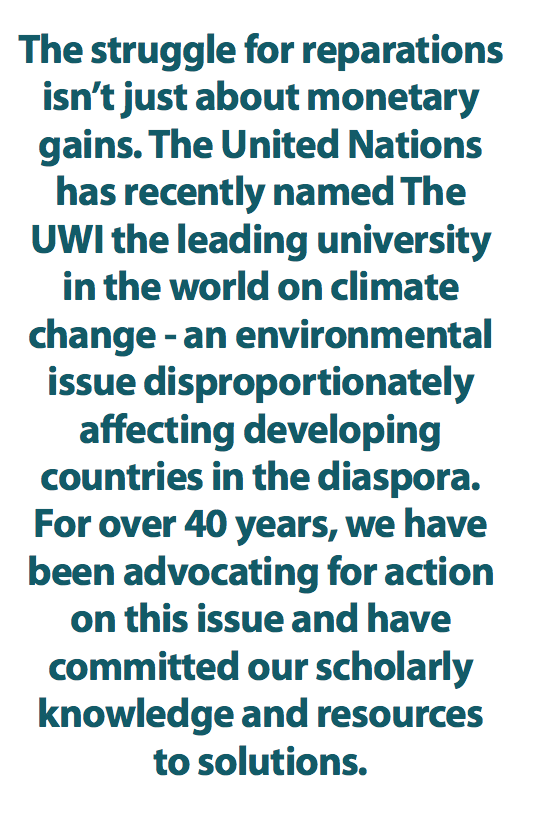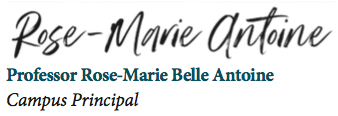enewing our commitment to activism and Africa
Sankofa is a word from the Asante Twi language of Ghana that means “go back and get it”. It’s rooted in an Akan proverb which when translated to English says, “It is not taboo to go back for what you have left behind.” Sankofa has become a popular symbol in the African Diaspora representing the necessity of remembrance and reconnection with our ancestors. The proverb begs the question, “How do we know where we’re going if we don’t know where we came from?”

It was in the spirit of Sankofa that I made a plea to the Honourable Prime Minister Dr Keith Rowley and the Minister of Education Dr Nyan Gadsby Dolly recently to return the mandatory teaching of history to secondary schools and to educate our children about the history of Africa and the struggle for reparations for descendants of enslaved African people. When I made this plea at the Distinguished Open Lecture series in August (see coverage in this issue), it was in the presence of His Royal Majesty Otumfuo Osei Tutu II, the Asantehene or King of the Ghanaian Asante Kingdom, who was our featured speaker and esteemed guest.
The Asantehene’s visit to Trinidad and Tobago was itself emblematic of Sankofa. Arriving at the official invitation of the Prime Minister for the Emancipation holiday, the Asantehene was here during a season of celebration of African heritage, a season of resistance and a season primed to chart a future for just societies. As I said at the lecture, The UWI as a premier university plays an important role in reconnecting and reclaiming our proud heritage for the benefit of mankind.

We have a long standing tradition at the university of undertaking leadership in the quest for a more equitable world. Our Vice Chancellor, Sir Hilary Beckles, has been a leader in the now global movement for reparations for over 30 years. Beckles, current chairman of the CARICOM Reparations Commission (CRC), and other scholars from The UWI were integral in the commission’s formation. We also established the Centre for Reparations Research at The UWI Mona. The CRC has outlined a 10-Point Action Plan for Reparations to promote the case for reparatory justice for the region’s indigenous and African descendant communities who are the victims of crimes against humanity in the forms of genocide, slavery, slave trading, and racial apartheid. Recently, The UWI in partnership with the CRC and the Grenada National Reparations Committee guided a historic public apology from the Trevelyan family of Grenada whose ancestors owned more than 1,000 slaves on that island. The apology was accompanied by £100,000 of funding towards an education fund for The UWI Open Campus. The apology was a marked achievement in the 10-Point Plan, but the work doesn’t end here.
This month, as we welcome new students, The UWI also welcomes a new programme with a mission directly aligned to this cause. September, 2023 will mark the first term and the first cohort of the MA/MSc in Reparatory Justice. As The UWI continues to champion reparations, we have partnered with the University of Glasgow on this programme designed for social activists in the Caribbean and African Diaspora.
The struggle for reparations isn’t just about monetary gains. The United Nations has recently named The UWI the leading university in the world on climate change - an environmental issue disproportionately affecting developing countries in the diaspora. For over 40 years, we have been advocating for action on this issue and have committed our scholarly knowledge and resources to solutions. Our own Professor Oliver Headley invented some of the first solar powered systems, positioning us as thought leaders in solar energy. This too, is part of the mission in seeking reparatory justice.
Each of these accomplishments circle back to our connection with Africa -- a connection we were reminded of by the Asantehene. As he said during his lecture, the Emancipation story is conjoined with African heritage and therefore inseparable from the African experience. He encouraged us to consider that the conditions of Africa today are the conditions of the Caribbean, as is the history. Though some of our new undergraduate students may not have learned this history in secondary school, we are sure that during your time at The UWI, the learning opportunities will abound. We invite you to uphold the long standing UWI tradition of activism, resistance and reconnecting with The Continent.
